The Olive
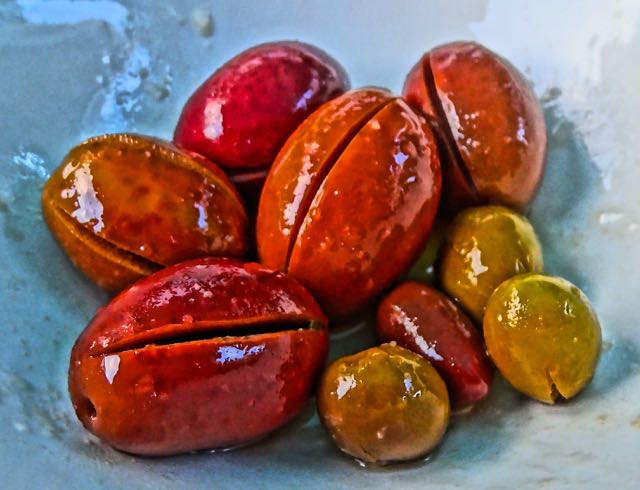 One of the mysteries of life is how on earth anyone could have eaten an olive off an olive tree and decided that this 'fruit' could somehow be edible. Next time you are in Greece you can try this yourself. Just reach up and pull off an olive, it does not matter if it is ripe or not, and take a little taste. You may find it to be one of the
nastiest things you have ever put in your mouth. And yet somehow this little fruit and the oil it gives has become the staple of not only
Greece but the entire Mediterranean. The ancient Greeks ate the ripe black olives and believed they were good for one's health, preserved in vinegar and seasoned with fennel as they still are today. For someone to say that they don't like olives, that is like saying they don't like candy because once they ate one that they did not like. There are just too many varieties and too many different flavors of olives for there not to be one that you will like. Green olives are unripe. Black olives are ripe. Between
these two main classifications there are all sorts of olives which are usually named after the areas they come from. The most well-known are the Kalamata olives which come from the area around the town of Kalamata in Messenia in the southern Peloponessos. When you order a Greek salad in the USA, that one olive sitting on
the tiny pile of crumbled feta is most likely from Kalamata. They are just as popular in Greece where everyone has their favorite olives. One of the mysteries of life is how on earth anyone could have eaten an olive off an olive tree and decided that this 'fruit' could somehow be edible. Next time you are in Greece you can try this yourself. Just reach up and pull off an olive, it does not matter if it is ripe or not, and take a little taste. You may find it to be one of the
nastiest things you have ever put in your mouth. And yet somehow this little fruit and the oil it gives has become the staple of not only
Greece but the entire Mediterranean. The ancient Greeks ate the ripe black olives and believed they were good for one's health, preserved in vinegar and seasoned with fennel as they still are today. For someone to say that they don't like olives, that is like saying they don't like candy because once they ate one that they did not like. There are just too many varieties and too many different flavors of olives for there not to be one that you will like. Green olives are unripe. Black olives are ripe. Between
these two main classifications there are all sorts of olives which are usually named after the areas they come from. The most well-known are the Kalamata olives which come from the area around the town of Kalamata in Messenia in the southern Peloponessos. When you order a Greek salad in the USA, that one olive sitting on
the tiny pile of crumbled feta is most likely from Kalamata. They are just as popular in Greece where everyone has their favorite olives.
|
|
 My favorite are the big round juicy olives from Amfissa just northwest of Delphi. My wife likes the cracked black olives which are marinated in salt and can be found in many places in Greece, especially on the islands. These can be seasoned with olive oil and oregano to make them taste even better. The cracked green olives are known as
tsakistes
and these are made like the black olives, though picked earlier. The olives are hit with a stone, not too hard because breaking the pit makes it bitter. They are then kept in water which is changed regularly which supposedly gets rid of even more of the bitterness. Then a brine is made from salt where the olive is kept throughout the year. In Aglia Kremezi's book The Foods of Greece she tells of her father putting in a raw egg and when a part of the egg the size of a 10 drachma piece was visible above the water,
then the amount of salt was right. The 10 drachma piece is no more but its about the size of a quarter. Wild fennel stems and lemons are then added for flavor. The largest olives I have ever seen came from Galata, across from the island of Poros and were grown by Takis and Zefi, the owners of the Saga Hotel. These were the size of a small potato. As you travel in Greece you will find restaurants that serve olives from their own area while some buy theirs at the supermarket. If you want to try
the local olives ask for elies dopio (eel-yes doe-pyo). My favorite are the big round juicy olives from Amfissa just northwest of Delphi. My wife likes the cracked black olives which are marinated in salt and can be found in many places in Greece, especially on the islands. These can be seasoned with olive oil and oregano to make them taste even better. The cracked green olives are known as
tsakistes
and these are made like the black olives, though picked earlier. The olives are hit with a stone, not too hard because breaking the pit makes it bitter. They are then kept in water which is changed regularly which supposedly gets rid of even more of the bitterness. Then a brine is made from salt where the olive is kept throughout the year. In Aglia Kremezi's book The Foods of Greece she tells of her father putting in a raw egg and when a part of the egg the size of a 10 drachma piece was visible above the water,
then the amount of salt was right. The 10 drachma piece is no more but its about the size of a quarter. Wild fennel stems and lemons are then added for flavor. The largest olives I have ever seen came from Galata, across from the island of Poros and were grown by Takis and Zefi, the owners of the Saga Hotel. These were the size of a small potato. As you travel in Greece you will find restaurants that serve olives from their own area while some buy theirs at the supermarket. If you want to try
the local olives ask for elies dopio (eel-yes doe-pyo).
The best place to buy olives is in the Athens central market in the shops that specialize in them, where you can taste them all before you buy.
|
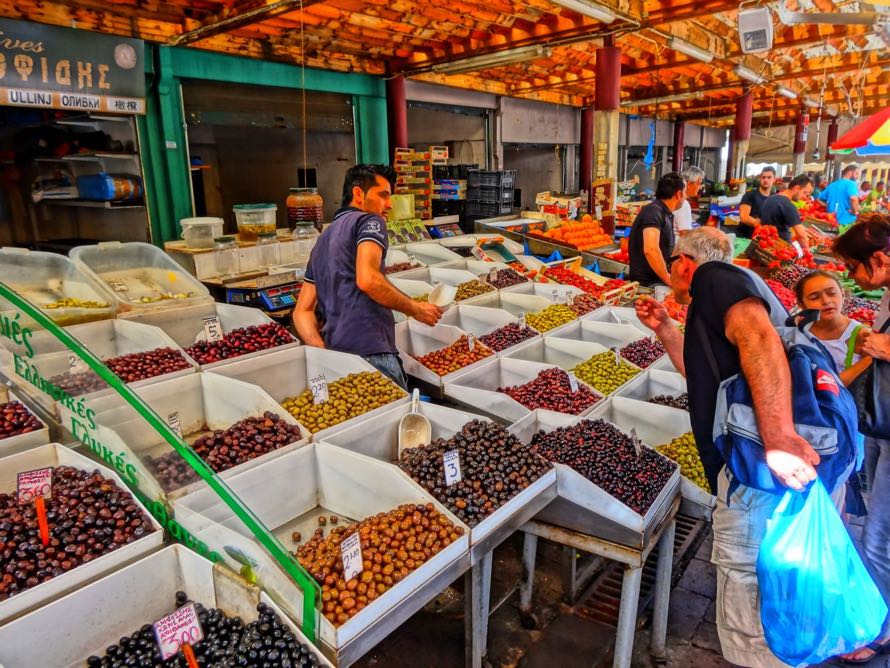 |
Olive Oil
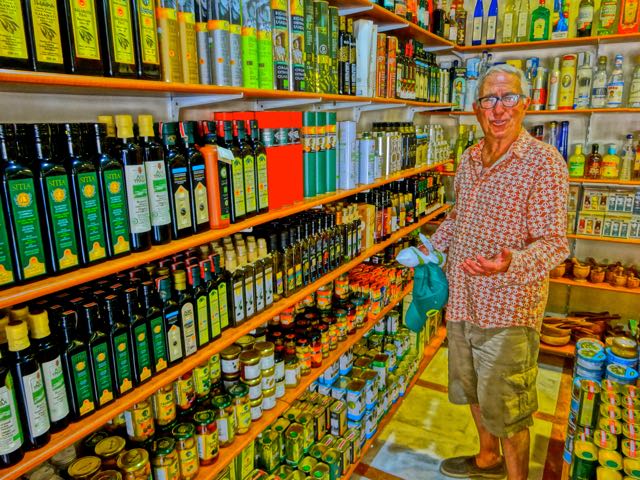 Greek olive oil is simply the best in the world. In fact it is so good that the Italians bought it in great quantities and slapped their labels on it and exported it to America. Now this practice is coming to an end and Greek Olive oil, particularly extra-virgin, is in great demand and you can find it in many supermarkets and gourmet
shops though
usually
at very high prices. This does not mean that there are not other countries making good olive oil. I have had Lebanese Olive oil that was delicious too. But overall the Greeks make the best olive oil. That may be because it has been in use since the days of the ancient Minoans and Myceneans and the Greeks consume more olive oil per person than any country in the world. The olives are picked by hand in late November and taken to the village cooperative or to the local privately owned pressing plant where the oil
is extracted. In some places they are pressed in the same way they have been for thousands of years using large wood and stone pieces of equipment that could be mistaken for medieval
torture devices. Greek olive oil is simply the best in the world. In fact it is so good that the Italians bought it in great quantities and slapped their labels on it and exported it to America. Now this practice is coming to an end and Greek Olive oil, particularly extra-virgin, is in great demand and you can find it in many supermarkets and gourmet
shops though
usually
at very high prices. This does not mean that there are not other countries making good olive oil. I have had Lebanese Olive oil that was delicious too. But overall the Greeks make the best olive oil. That may be because it has been in use since the days of the ancient Minoans and Myceneans and the Greeks consume more olive oil per person than any country in the world. The olives are picked by hand in late November and taken to the village cooperative or to the local privately owned pressing plant where the oil
is extracted. In some places they are pressed in the same way they have been for thousands of years using large wood and stone pieces of equipment that could be mistaken for medieval
torture devices.
|
|
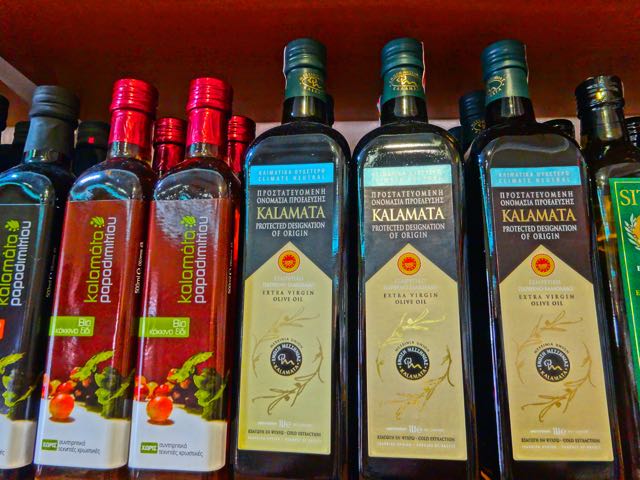 Nowadays though the oil is extracted by high-speed centrifugal machines. The oil which comes from this method is
called Extra-Virgin.
It is the first pressing and you need roughly 5 kilos of olives to make one kilo of olive oil. This is the healthiest olive oil you can eat and it may be the healthiest thing you can eat on the planet. The best olive oil comes from the island of Lesvos, as anbody from Lesvos will tell you. But there are those people who will swear by olive oil from Crete or Kalamata in the Peloponessos, usually people from Crete or from Kalamata. But I asked my friend and chef Giorgos Kantelis, owner of the Bakalogatos Restaurant
in Kypseli and he says the best olive oil comes from Sitia, Crete. He is from the island of Kassos, not Sitia. Nowadays though the oil is extracted by high-speed centrifugal machines. The oil which comes from this method is
called Extra-Virgin.
It is the first pressing and you need roughly 5 kilos of olives to make one kilo of olive oil. This is the healthiest olive oil you can eat and it may be the healthiest thing you can eat on the planet. The best olive oil comes from the island of Lesvos, as anbody from Lesvos will tell you. But there are those people who will swear by olive oil from Crete or Kalamata in the Peloponessos, usually people from Crete or from Kalamata. But I asked my friend and chef Giorgos Kantelis, owner of the Bakalogatos Restaurant
in Kypseli and he says the best olive oil comes from Sitia, Crete. He is from the island of Kassos, not Sitia.
Pure or refined olive oil is extracted at high temperatures. It is less healthy, and less tasty though it is often flavored with extra vergin. What it is good for is frying because it has a higher burning temperature. I have this argument at home often when my wife asks me why I buy that "Pure Olive Oil Crap". I explain patiently over and over again that the extra-virgin should be used in salads, over fish, in stews
and soups
after the cooking is over or even for dipping bread into. To fry with it or even saute can ruin the oil and the taste of the food. That is what refined is for. At the bottom of the olive oil totem pole is the Pomace which is the bottom of the barrel, extracted chemically. It makes better soap than cooking or eating. For those visiting Athens and looking for olive oil to bring home as gifts or for your own use, Evonon at 124 Adrianou in the Plaka call themselves a traditional Greek
Products shop. They sell all sorts of food, herbs and soaps but their main emphasis is on Greek olives and Greek extra virgin olive oil from all over the country which they sell in all shapes and sizes in containers that will withstand even the most violent or careless airline luggage handler.
|
Bread
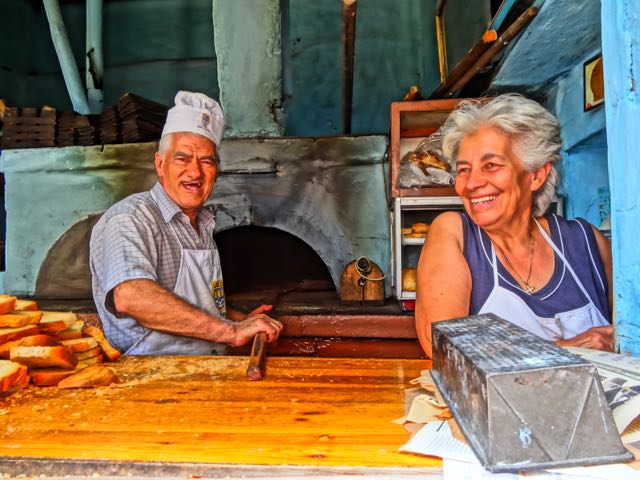 The busiest shop in any Greek village is the local bakery. Bread was at one time the staple food of Greece and is still eaten at every meal, large hunks dipped in remaining sauce and olive oil, or coated with tsatziki (garlic-cucumber-yogurt dip), tarama salata (fish roe salad) or melitzana salata
(eggplant salad). There is nothing
better
than going to a local bakery and buying a loaf of fresh village bread and eating it while it is still hot. Some village bakeries still use wood burning stoves and the same wholesome recipes their fathers and grandfathers had used. Others have bent to the desire of the Athenian middle-class, making bread with white flour. Lately there has been a surge in the popularity of the healthier dark bread sometimes called mavro psomi. Horiatiko psomi means village bread and that is usually a mixture
of whole and refined flour. There are also breads for different occasions. The busiest shop in any Greek village is the local bakery. Bread was at one time the staple food of Greece and is still eaten at every meal, large hunks dipped in remaining sauce and olive oil, or coated with tsatziki (garlic-cucumber-yogurt dip), tarama salata (fish roe salad) or melitzana salata
(eggplant salad). There is nothing
better
than going to a local bakery and buying a loaf of fresh village bread and eating it while it is still hot. Some village bakeries still use wood burning stoves and the same wholesome recipes their fathers and grandfathers had used. Others have bent to the desire of the Athenian middle-class, making bread with white flour. Lately there has been a surge in the popularity of the healthier dark bread sometimes called mavro psomi. Horiatiko psomi means village bread and that is usually a mixture
of whole and refined flour. There are also breads for different occasions.
|
|
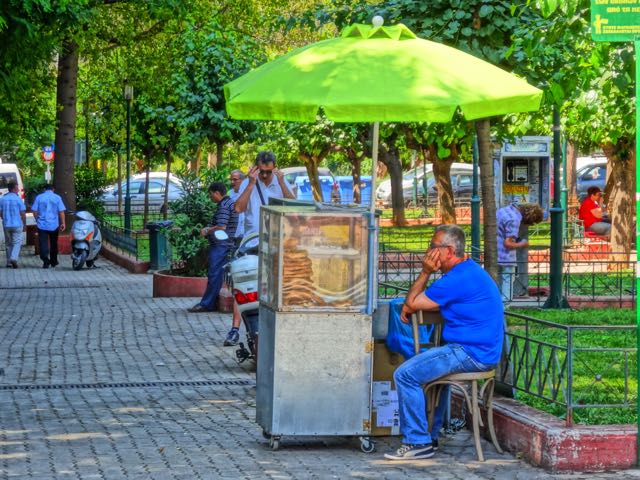 On Clean Monday, the first day of the 40 days of fasting before easter there is an unleavened bread sold on the streets and in parks or wherever people congregate. During Easter there is the famous bread with the red easter egg in the middle of it. Bread is a very important part of Greek religious services and I have seen my sister-in-law
make sure every person in the village received a piece of the holy bread from her aunt's memorial service. let us not forget pita bread which every
souvlaki is wrapped in, and paxamadia, the hard bread which is eaten at breakfast, dipped in hot milk or coffee, or found under the tomatoes, onions, feta and olives of the Cretan dakos salad. Also in the bread category are koulouria which are like skinny bagels and are the food for people on the run, sold on the street by venders on foot or with small carts, most of which originate from a small bread factory in Psiri. On Clean Monday, the first day of the 40 days of fasting before easter there is an unleavened bread sold on the streets and in parks or wherever people congregate. During Easter there is the famous bread with the red easter egg in the middle of it. Bread is a very important part of Greek religious services and I have seen my sister-in-law
make sure every person in the village received a piece of the holy bread from her aunt's memorial service. let us not forget pita bread which every
souvlaki is wrapped in, and paxamadia, the hard bread which is eaten at breakfast, dipped in hot milk or coffee, or found under the tomatoes, onions, feta and olives of the Cretan dakos salad. Also in the bread category are koulouria which are like skinny bagels and are the food for people on the run, sold on the street by venders on foot or with small carts, most of which originate from a small bread factory in Psiri.
If you are a bread lover you will find the bakeries in Athens to be a paradise of baked goods, probably better than what you are used to at home. If you are on the islands and doing the club thing til the wee hours of morning, you can go to the bakery around sunrise for hot bread and tiropitas.
|
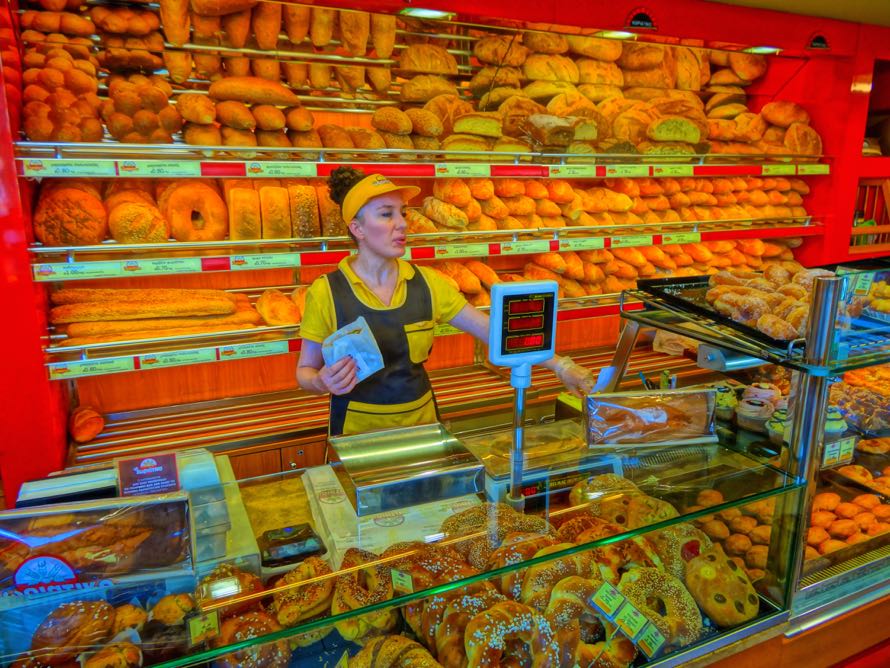 |
|



 One of the mysteries of life is how on earth anyone could have eaten an olive off an olive tree and decided that this 'fruit' could somehow be edible. Next time you are in Greece you can try this yourself. Just reach up and pull off an olive, it does not matter if it is ripe or not, and take a little taste. You may find it to be one of the
nastiest things you have ever put in your mouth. And yet somehow this little fruit and the oil it gives has become the staple of not only
Greece but the entire Mediterranean. The ancient Greeks ate the ripe black olives and believed they were good for one's health, preserved in vinegar and seasoned with fennel as they still are today. For someone to say that they don't like olives, that is like saying they don't like candy because once they ate one that they did not like. There are just too many varieties and too many different flavors of olives for there not to be one that you will like. Green olives are unripe. Black olives are ripe. Between
these two main classifications there are all sorts of olives which are usually named after the areas they come from. The most well-known are the Kalamata olives which come from the area around the town of Kalamata in Messenia in the southern
One of the mysteries of life is how on earth anyone could have eaten an olive off an olive tree and decided that this 'fruit' could somehow be edible. Next time you are in Greece you can try this yourself. Just reach up and pull off an olive, it does not matter if it is ripe or not, and take a little taste. You may find it to be one of the
nastiest things you have ever put in your mouth. And yet somehow this little fruit and the oil it gives has become the staple of not only
Greece but the entire Mediterranean. The ancient Greeks ate the ripe black olives and believed they were good for one's health, preserved in vinegar and seasoned with fennel as they still are today. For someone to say that they don't like olives, that is like saying they don't like candy because once they ate one that they did not like. There are just too many varieties and too many different flavors of olives for there not to be one that you will like. Green olives are unripe. Black olives are ripe. Between
these two main classifications there are all sorts of olives which are usually named after the areas they come from. The most well-known are the Kalamata olives which come from the area around the town of Kalamata in Messenia in the southern  My favorite are the big round juicy olives from Amfissa just northwest of Delphi. My wife likes the cracked black olives which are marinated in salt and can be found in many places in Greece, especially on the islands. These can be seasoned with olive oil and oregano to make them taste even better. The cracked green olives are known as
tsakistes
and these are made like the black olives, though picked earlier. The olives are hit with a stone, not too hard because breaking the pit makes it bitter. They are then kept in water which is changed regularly which supposedly gets rid of even more of the bitterness. Then a brine is made from salt where the olive is kept throughout the year. In Aglia Kremezi's book The Foods of Greece she tells of her father putting in a raw egg and when a part of the egg the size of a 10 drachma piece was visible above the water,
then the amount of salt was right. The 10 drachma piece is no more but its about the size of a quarter. Wild fennel stems and lemons are then added for flavor. The largest olives I have ever seen came from Galata, across from the island of Poros and were grown by Takis and Zefi, the owners of the Saga Hotel. These were the size of a small potato. As you travel in Greece you will find restaurants that serve olives from their own area while some buy theirs at the supermarket. If you want to try
the local olives ask for elies dopio (eel-yes doe-pyo).
My favorite are the big round juicy olives from Amfissa just northwest of Delphi. My wife likes the cracked black olives which are marinated in salt and can be found in many places in Greece, especially on the islands. These can be seasoned with olive oil and oregano to make them taste even better. The cracked green olives are known as
tsakistes
and these are made like the black olives, though picked earlier. The olives are hit with a stone, not too hard because breaking the pit makes it bitter. They are then kept in water which is changed regularly which supposedly gets rid of even more of the bitterness. Then a brine is made from salt where the olive is kept throughout the year. In Aglia Kremezi's book The Foods of Greece she tells of her father putting in a raw egg and when a part of the egg the size of a 10 drachma piece was visible above the water,
then the amount of salt was right. The 10 drachma piece is no more but its about the size of a quarter. Wild fennel stems and lemons are then added for flavor. The largest olives I have ever seen came from Galata, across from the island of Poros and were grown by Takis and Zefi, the owners of the Saga Hotel. These were the size of a small potato. As you travel in Greece you will find restaurants that serve olives from their own area while some buy theirs at the supermarket. If you want to try
the local olives ask for elies dopio (eel-yes doe-pyo). Greek olive oil is simply the best in the world. In fact it is so good that the Italians bought it in great quantities and slapped their labels on it and exported it to America. Now this practice is coming to an end and Greek Olive oil, particularly extra-virgin, is in great demand and you can find it in many supermarkets and gourmet
shops though
usually
at very high prices. This does not mean that there are not other countries making good olive oil. I have had Lebanese Olive oil that was delicious too. But overall the Greeks make the best olive oil. That may be because it has been in use since the days of the ancient Minoans and Myceneans and the Greeks consume more olive oil per person than any country in the world. The olives are picked by hand in late November and taken to the village cooperative or to the local privately owned pressing plant where the oil
is extracted. In some places they are pressed in the same way they have been for thousands of years using large wood and stone pieces of equipment that could be mistaken for medieval
torture devices.
Greek olive oil is simply the best in the world. In fact it is so good that the Italians bought it in great quantities and slapped their labels on it and exported it to America. Now this practice is coming to an end and Greek Olive oil, particularly extra-virgin, is in great demand and you can find it in many supermarkets and gourmet
shops though
usually
at very high prices. This does not mean that there are not other countries making good olive oil. I have had Lebanese Olive oil that was delicious too. But overall the Greeks make the best olive oil. That may be because it has been in use since the days of the ancient Minoans and Myceneans and the Greeks consume more olive oil per person than any country in the world. The olives are picked by hand in late November and taken to the village cooperative or to the local privately owned pressing plant where the oil
is extracted. In some places they are pressed in the same way they have been for thousands of years using large wood and stone pieces of equipment that could be mistaken for medieval
torture devices.  Nowadays though the oil is extracted by high-speed centrifugal machines. The oil which comes from this method is
called Extra-Virgin.
It is the first pressing and you need roughly 5 kilos of olives to make one kilo of olive oil. This is the healthiest olive oil you can eat and it may be the healthiest thing you can eat on the planet. The best olive oil comes from the island of Lesvos, as anbody from Lesvos will tell you. But there are those people who will swear by olive oil from Crete or Kalamata in the Peloponessos, usually people from Crete or from Kalamata. But I asked my friend and chef Giorgos Kantelis, owner of the Bakalogatos Restaurant
in Kypseli and he says the best olive oil comes from Sitia, Crete. He is from the island of Kassos, not Sitia.
Nowadays though the oil is extracted by high-speed centrifugal machines. The oil which comes from this method is
called Extra-Virgin.
It is the first pressing and you need roughly 5 kilos of olives to make one kilo of olive oil. This is the healthiest olive oil you can eat and it may be the healthiest thing you can eat on the planet. The best olive oil comes from the island of Lesvos, as anbody from Lesvos will tell you. But there are those people who will swear by olive oil from Crete or Kalamata in the Peloponessos, usually people from Crete or from Kalamata. But I asked my friend and chef Giorgos Kantelis, owner of the Bakalogatos Restaurant
in Kypseli and he says the best olive oil comes from Sitia, Crete. He is from the island of Kassos, not Sitia. The busiest shop in any Greek village is the local bakery. Bread was at one time the staple food of Greece and is still eaten at every meal, large hunks dipped in remaining sauce and olive oil, or coated with tsatziki (garlic-cucumber-yogurt dip), tarama salata (fish roe salad) or melitzana salata
(eggplant salad). There is nothing
better
than going to a local bakery and buying a loaf of fresh village bread and eating it while it is still hot. Some village bakeries still use wood burning stoves and the same wholesome recipes their fathers and grandfathers had used. Others have bent to the desire of the Athenian middle-class, making bread with white flour. Lately there has been a surge in the popularity of the healthier dark bread sometimes called mavro psomi. Horiatiko psomi means village bread and that is usually a mixture
of whole and refined flour. There are also breads for different occasions.
The busiest shop in any Greek village is the local bakery. Bread was at one time the staple food of Greece and is still eaten at every meal, large hunks dipped in remaining sauce and olive oil, or coated with tsatziki (garlic-cucumber-yogurt dip), tarama salata (fish roe salad) or melitzana salata
(eggplant salad). There is nothing
better
than going to a local bakery and buying a loaf of fresh village bread and eating it while it is still hot. Some village bakeries still use wood burning stoves and the same wholesome recipes their fathers and grandfathers had used. Others have bent to the desire of the Athenian middle-class, making bread with white flour. Lately there has been a surge in the popularity of the healthier dark bread sometimes called mavro psomi. Horiatiko psomi means village bread and that is usually a mixture
of whole and refined flour. There are also breads for different occasions. On Clean Monday, the first day of the 40 days of fasting before easter there is an unleavened bread sold on the streets and in parks or wherever people congregate. During Easter there is the famous bread with the red easter egg in the middle of it. Bread is a very important part of Greek religious services and I have seen my sister-in-law
make sure every person in the village received a piece of the holy bread from her aunt's memorial service. let us not forget pita bread which every
souvlaki is wrapped in, and paxamadia, the hard bread which is eaten at breakfast, dipped in hot milk or coffee, or found under the tomatoes, onions, feta and olives of the Cretan dakos salad. Also in the bread category are koulouria which are like skinny bagels and are the food for people on the run, sold on the street by venders on foot or with small carts, most of which originate from a small bread factory in Psiri.
On Clean Monday, the first day of the 40 days of fasting before easter there is an unleavened bread sold on the streets and in parks or wherever people congregate. During Easter there is the famous bread with the red easter egg in the middle of it. Bread is a very important part of Greek religious services and I have seen my sister-in-law
make sure every person in the village received a piece of the holy bread from her aunt's memorial service. let us not forget pita bread which every
souvlaki is wrapped in, and paxamadia, the hard bread which is eaten at breakfast, dipped in hot milk or coffee, or found under the tomatoes, onions, feta and olives of the Cretan dakos salad. Also in the bread category are koulouria which are like skinny bagels and are the food for people on the run, sold on the street by venders on foot or with small carts, most of which originate from a small bread factory in Psiri. 
